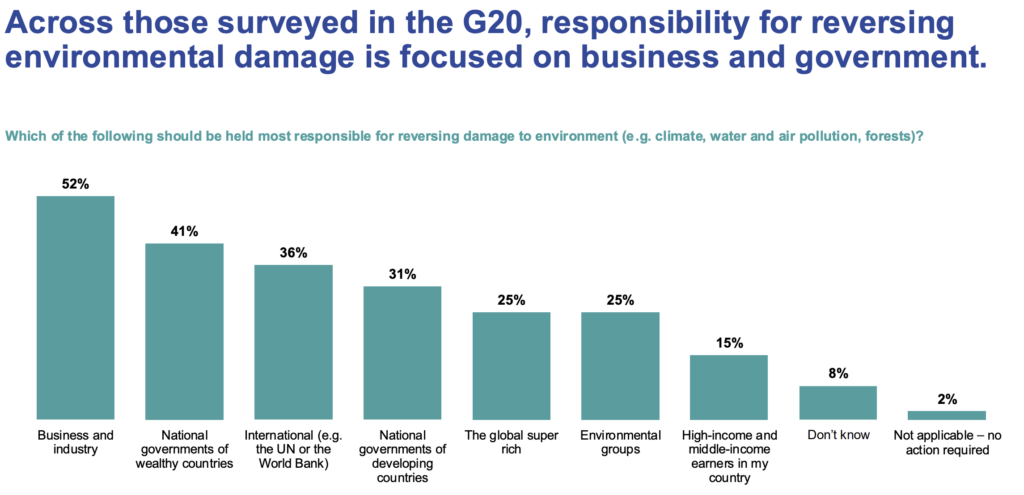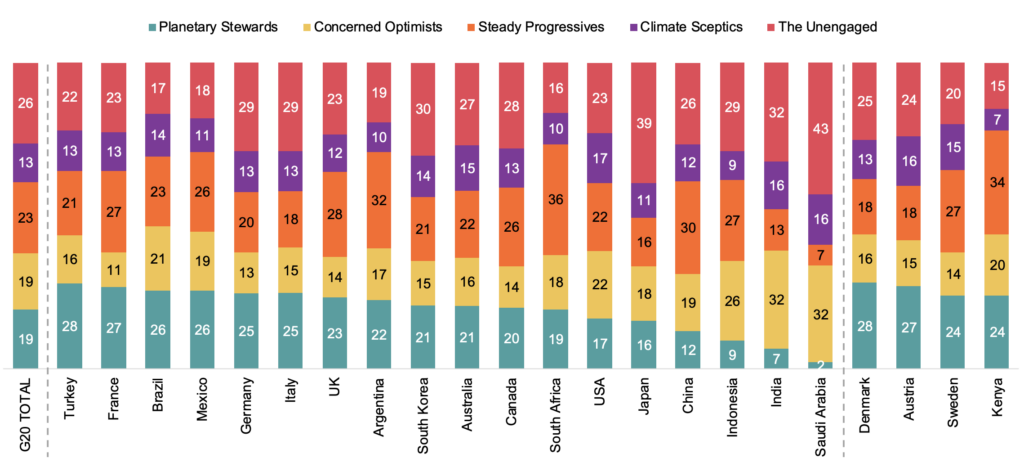60% of Global Consumers Back Policies to Reduce Meat Consumption & Promote Healthier Diets
5 Mins Read
In a global climate change poll, 60% of consumers said they’d support government policies encouraging meat reduction to lower greenhouse gas emissions.
People are worried about the state of the environment, what businesses are doing to it, and what governments aren’t doing to combat it, a new global survey shows.
Conducted by Ipsos UK on behalf of Earth4All and the Global Commons Alliance, the Global Commons Survey 2024 asked the opinion of 22,000 people from 22 countries, including 19 of the G20 nations (excluding Russia).
The pollsters found that 88% of people were at least somewhat worried about the state of nature, and 87% were uneasy about how we’re leaving it for future generations. Women and populations with higher exposure to climate change expressed greater concern.
People in developing economies like India, Kenya and Indonesia also felt more personally exposed to the crisis than those in the US or Europe, and also exhibited the highest concern and urgency about climate action.

One measure to combat the climate crisis is dietary change – meat and dairy production amounts to as much as 20% of the world’s emissions. The survey saw 60% of consumers express support for policies that advocate for healthier diets and reduced meat consumption to lower emissions.
While experts and organisations like the UN FAO have suggested that meat consumption in low-income countries needs to increase (while richer nations need to eat less of it), the poll’s results show a contrast. People in developing countries like Kenya (80%), Indonesia (77%), India (74%) and Mexico (72%) were the most supportive of such policies.
On the other hand, richer countries like Japan were the least supportive (34%), and expressed the highest level of opposition, such as Sweden (21%) and Denmark (24%) – a surprising finding given the latter has been on the forefront of the fight against livestock emissions.
Majority of the world supports criminalising ecocide

Over half (52%) of the people in G20 countries feel personally exposed to the risks of the climate emergency. This is because for 74% of respondents, their personal health and wellbeing is closely connected to that of the environment.
Scientists have warned of climate tipping points – irreversible events spurred by climate change that will have devastating impacts on the planet and its people – and 69% of people agree that the Earth is close to these eventualities, primarily due to human activities.
This is why 72% of consumers support criminalising actions that will likely cause serious damage to the climate and nature. The sector bearing the brunt of the blame is business and industry (52%), with governments of rich countries (42%) not far behind in the pecking order.
Another 36% of respondents think international bodies like the UN should be responsible for reversing damage to the climate, while a quarter (25%) also say it should be the ultra-rich – the world’s wealthiest 1% produce so many emissions, it would take 1,500 years for someone in the bottom 99% to generate as much CO2e.
Consumers are calling on leaders and stakeholders to act, and act now. Over seven in 10 believe the world needs to take major action within the next decade to reduce emissions from electricity, transport, food, industry, and buildings, highlighting the urgency of the situation. Moreover, 60% believe the cost of environmental damage is much higher than the cost of investments needed for a green transition.
“People everywhere are very worried about the state of our planet and they’re feeling the pain already. Awareness that we are close to tipping points is high, as is concern that political priorities lie elsewhere,” said Jane Madgwick, executive director of the Global Commons Alliance.
“It all comes down to what we can do collectively to safeguard and restore the global commons which sustain all life on Earth and protect us from the most severe impacts of climate change. This is going to take bold leadership and a truly global effort, connecting actions across nations and from the ground up,” she added.
Climate indifference and scepticism alarmingly high

The pollsters classed the respondents into five segments, based on their attitudes to planetary stewardship, ranging from those concerned about the emergency to people who are unengaged.
Planetary Stewards are driven by a sense of urgency and responsibility, and advocate for systemic change to tackle the climate crisis. This is a group highly pessimistic about the future – whether that’s personal, national or global – with 97% calling for immediate action.
The next segment involves Concerned Optimists, a blend of high environmental concern with optimism about the future – 76% think we need to act now, but 50% are very optimistic about their personal futures, and a third say the same about the world.
On the middle of the scale lie the Steady Progressives, characterised by pragmatism and a moderate approach. Here, 85% think immediate climate action is necessary, but seek balanced, gradual solutions that tackle the challenges without resorting to extremes.
Then there are the Climate Sceptics. They dismiss environmental concerns and oppose policies that address them, and represent the highest level of disagreement about the planet being close to tipping points (46% versus 9% of the G20 average). They perceive themselves to be less exposed to the risks, and are more likely to believe in individual liberty and limited government intervention.
Finally, the Unengaged are a group of people who display a lack of interest and engagement in climate and politics. Only a third (34%) are worried about the state of nature today, and are less likely than the global average to support significant changes to political and economic systems.
Worryingly, the latter make up the largest group in the survey, accounting for a quarter (26%) of its respondents. Another 13% are sceptics – this means that nearly four in 10 consumers globally are unengaged or sceptical about the climate crisis. This is higher than the number of Planetary Stewards and Concerned Optimists (19% each) identified in the study.
That said, overall, only a third of consumers think their governments are doing enough – a higher share of respondents think the opposite (37%). This sentiment is strongest in South Africa, where 51% believe their country’s climate action is insufficient, followed by Argentina (50%), France (47%), and the UK (46%).
But people in Saudi Arabia (62%) and India (61%) are the most satisfied about their governments’ efforts to combat climate change. In the former – whose state-owned oil company Saudi Aramco is the greatest corporate contributor to global emissions since 1965 – only 8% of people think that their lawmakers need to do more.



